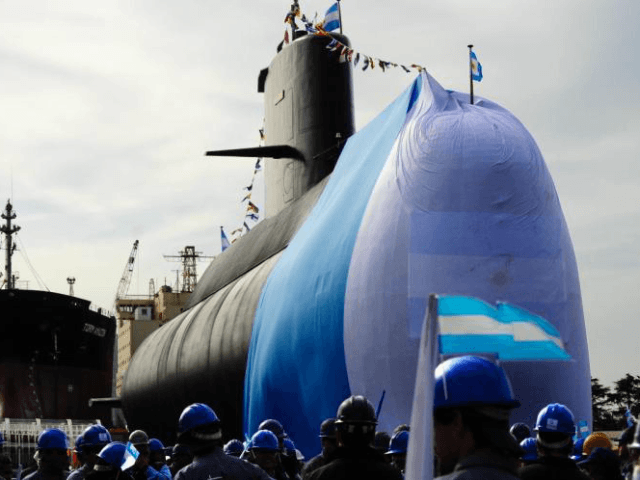The mystery surrounding the disappeared Argentina’s ARA San Juan submarine took a dark turn this week, as officials confirmed the recording of a “hydroacoustic anomaly” near where the navy had last recorded the submarine’s location. Officials believe an explosion occurred, but have no answers as to why.
Officials last heard from the San Juan on November 15, in the deep waters about 270 miles off the east coast of Argentina. On November 18, the nation’s Ministry of Defense told reporters that it had recorded seven attempted, but failed, calls from the submarine, which may have been an indication that the vessel was running out of oxygen. They did not record any emergency/SOS calls, however, and have not found any evidence of its whereabouts.
On Thursday, the Argentine Navy confirmed that multiple sensors in the Atlantic Ocean had documented an event “consistent with an explosion” in the vicinity of where the submarine would have been before it disappeared. Argentina’s ambassador to Austria, Rafael Grossi, approached the Comprehensive Nuclear-Test-Ban Treaty Organization (CTBTO) with a request to scan its recordings of surveillance activity in the Atlantic for any evidence of incidents near the submarine. The surveillance technology the CTBTO uses to track potential nuclear testing found that a “hydroacoustic anomaly” that was “singular, short, violent, and non-nuclear” had occurred near the area where the submarine was believed to have been located on November 15.
American officials confirmed the report by cross-comparing with their own surveillance. The United States and Russia have donated military time and effort to find the lost vessel.
Argentine Navy spokesman Enrique Balbi told reporters on Friday that search and rescue operations would continue, as no evidence has led investigators to the final location of the submarine.
“The area is large … it is hostile,” Balbi warned. “The diameter of the area implies a variety of depths in a short space, as well. We do not want to give any conjecture yet because we don’t know where the submarine is.”
Asked whether the evidence of an explosion suggests an attack on Argentina, Balbi said, “There is no indication of that, but we have not discounted any hypothesis.”
Grossi, the Argentine ambassador, also told the outlet Infobae that he would be shocked if the incident was an attack. “What happened has nothing to do with a military attack,” he said, “Because, first of all, we would have detected another vessel in the area, and secondly, it would be a different phenomenon, with a signal with another type of curve, longer and with more echo.”
Argentina is not engaged in any military disputes or wars and only has major political tensions with one neighbor: Venezuela, which does not boast a significant navy. Venezuela is allied with Iran, however, responsible for the deadliest terrorist attack in the history of the Western Hemisphere before September 2001, in Buenos Aires, Argentina.
The only incident Argentina has had with another country on the high seas in recent memory has been the sinking of a Chinese Coast Guard vessel that had violated Argentina’s maritime sovereignty in 2016. China has endeavored to expand its military presence in Latin America, but there is no evidence of tensions between China and Argentina that would trigger an attack.
An accident appears much more likely for the San Juan, particularly given the testimony of a relative of one of the 44 crew members on board, who told media that the submarine had experienced a nearly-deadly emergency in 2014. María Itatí Leguizamón, wife of crew member Germán Oscar Suárez, told reporters that he had told her that “they had an incident in 2014 and that it was grave, and that’s all … since everything turned out alright, these are things they tell family, not the press.” The incident reportedly involved the submarine losing its ability to surface for an unspecified amount of time.
Relatives of those on the submarine have reacted to the news of an explosion with outrage, questioning how it could be possible that it took the navy a week to figure out that their relatives are likely dead. The Daily Mail reports that the navy told relatives on Thursday not to keep their hopes too high for their loved ones, though Balbi specifically told reporters that officials will not give any definitive theories on what happened without any knowledge of where the submarine is.

COMMENTS
Please let us know if you're having issues with commenting.